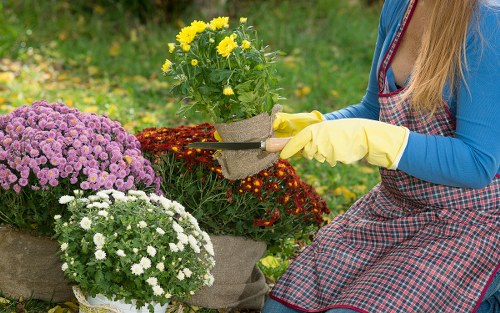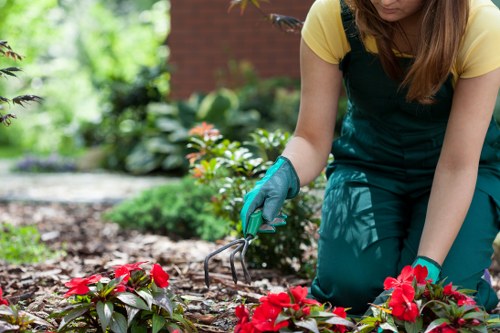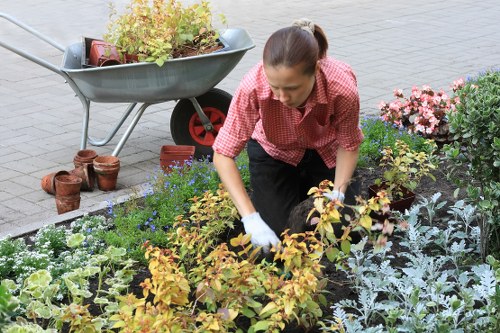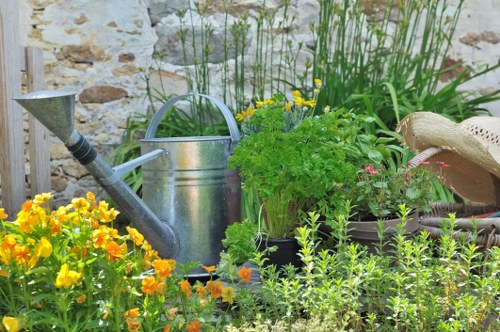Ultimate Guide to Garden Maintenance in Brixton

Introduction to Garden Maintenance
Maintaining a beautiful garden in Brixton requires a blend of passion, knowledge, and the right techniques. Whether you're a seasoned gardener or a beginner, understanding the unique climate and soil conditions of Brixton is essential for thriving plant life.
With its vibrant community and urban setting, Brixton offers a unique backdrop for garden enthusiasts. Proper maintenance not only enhances the aesthetic appeal but also contributes to environmental sustainability and personal well-being.
In this guide, we'll explore the key aspects of garden maintenance tailored specifically for the Brixton area, ensuring your garden remains lush, healthy, and vibrant all year round.

Understanding Brixton’s Climate and Soil
Climate Considerations
Brixton experiences a temperate maritime climate, characterized by mild winters and warm summers. Understanding these climate patterns is crucial for selecting appropriate plants and planning maintenance activities.
The moderate rainfall throughout the year ensures that plants receive adequate moisture, but it's important to manage drainage to prevent waterlogging, especially during heavy rains.
Microclimates within Brixton can vary based on factors like proximity to buildings, shade from trees, and urban heat islands, so it's beneficial to observe and adapt to these variations in your garden maintenance plan.

Essential Garden Maintenance Tasks
Regular Pruning and Trimming
Pruning is vital for the health and appearance of your garden. It helps in removing dead or diseased branches, promoting better air circulation, and encouraging new growth.
Trim overgrown shrubs and trees to maintain their shape and prevent them from becoming a hazard during storms. Use sharp, clean tools to make precise cuts and minimize damage to the plants.
Different plants have specific pruning needs, so it's important to research or consult with a local gardening expert to ensure you're following the best practices for each species in your garden.

Soil Health and Fertilization
Testing and Improving Soil Quality
Healthy soil is the foundation of a thriving garden. Conducting regular soil tests helps determine nutrient levels, pH balance, and soil composition, allowing you to make informed decisions about amendments and fertilizers.
Add organic matter such as compost or well-rotted manure to improve soil structure, enhance fertility, and promote beneficial microbial activity. This also aids in moisture retention and drainage.
Amending soil based on test results ensures that your plants receive the necessary nutrients, leading to robust growth and increased resistance to pests and diseases.

Pest and Disease Management
Identifying and Controlling Common Pests
Pests can pose a significant threat to your garden's health. Regular monitoring helps in early detection and effective management of common garden pests like aphids, slugs, and caterpillars.
- Aphids: Use natural predators like ladybugs or apply neem oil to control infestations.
- Slugs: Create barriers with copper tape or use diatomaceous earth to deter them.
- Caterpillars: Handpick them off plants or introduce beneficial insects like parasitic wasps.
Implementing integrated pest management (IPM) strategies reduces reliance on chemical pesticides, promoting a healthier and more sustainable garden ecosystem.
Seasonal Garden Maintenance
Spring Maintenance Tips
Spring is the perfect time to prepare your garden for the growing season. Start by clearing any debris from winter, pruning dead branches, and refreshing mulch to retain moisture.
Plant new flowers, vegetables, and herbs to take advantage of the warmer weather. Ensure proper spacing and provide adequate support for climbing plants.
Conduct a thorough soil test and apply necessary fertilizers to replenish nutrients depleted over the winter months.
Summer Care Strategies
During the summer, focus on regular watering, especially during dry spells. Deep watering in the early morning helps plants absorb moisture effectively without excessive evaporation.
Monitor for pests and diseases, addressing any issues promptly to prevent widespread damage. Providing partial shade to sensitive plants can help them thrive in the heat.
Continuously harvest vegetables and flowers to encourage further growth and maintain a tidy garden appearance.
Autumn Preparations
As temperatures begin to drop, start preparing your garden for the winter months. Remove spent plants and dead foliage to prevent pests and diseases from overwintering.
Plant autumn annuals and bulbs to ensure a colorful garden in the spring. Apply a layer of mulch to insulate roots and protect plants from frost.
Prune deciduous trees and shrubs while they are dormant to promote healthy growth in the following year.
Winter Maintenance Tasks
Winter gardening focuses on protecting plants from freezing temperatures. Cover delicate plants with frost cloths or straw to shield them from harsh weather.
Maintain garden tools by cleaning and storing them properly to prevent rust and damage. Use this time to plan and design for the upcoming gardening season.
Consider greenhouse gardening to extend the growing season and cultivate plants that require warmer climates.
Sustainable Gardening Practices
Composting and Mulching
Composting transforms kitchen scraps and garden waste into rich organic matter that enhances soil fertility. Set up a compost bin and regularly add materials like vegetable peels, leaves, and grass clippings.
Mulching conserves soil moisture, suppresses weeds, and regulates soil temperature. Use organic mulches such as wood chips, straw, or shredded leaves for added benefits.
These sustainable practices reduce waste, improve soil health, and create a more eco-friendly garden environment.
Water Conservation Techniques
Implementing water-saving techniques is crucial, especially during dry summer months. Install drip irrigation systems to deliver water directly to plant roots, minimizing evaporation and runoff.
Collect rainwater using barrels or rainwater harvesting systems to utilize natural precipitation for your garden's needs.
Choose drought-resistant plants that require less water, reducing the overall water consumption of your garden.
Encouraging Biodiversity
A diverse garden attracts beneficial insects, birds, and other wildlife, promoting a balanced ecosystem. Plant a variety of flowers, herbs, and native plants to support different species.
Create habitats such as birdhouses, insect hotels, and water features to provide shelter and resources for wildlife.
By fostering biodiversity, you enhance the resilience of your garden against pests and environmental changes.
Choosing the Right Plants for Brixton Gardens
Flowering Plants
Selecting the right flowering plants ensures a vibrant and colorful garden. Some popular choices for Brixton include:
- Roses: Classic and versatile, roses add elegance to any garden.
- Lavender: Known for its fragrance and attractiveness to pollinators.
- Geraniums: Hardy and easy to maintain, ideal for borders and containers.
Consider the bloom time, color, and maintenance needs when selecting flowering plants to create a harmonious and visually appealing garden.
Vegetable and Herb Gardens
Growing your own vegetables and herbs can be rewarding and practical. Common choices for Brixton gardens include:
- Tomatoes: Require ample sunlight and regular watering.
- Basil: A versatile herb that complements various dishes.
- Spinach: Fast-growing and nutritious, perfect for continuous harvesting.
Ensure proper spacing, soil conditions, and pest management to maximize the yield and health of your vegetable and herb gardens.
Integrating companion planting techniques can further enhance growth and deter pests naturally.
Shade and Sun Plants
Understanding the light requirements of plants is essential for successful gardening. In Brixton, different areas of your garden may receive varying amounts of sunlight.
- Full Sun Plants: Require at least six hours of direct sunlight daily, such as sunflowers and marigolds.
- Partial Shade Plants: Thrive with three to six hours of sunlight, like hostas and impatiens.
- Shade Plants: Prefer less than three hours of direct sunlight, ideal for areas under large trees or buildings, such as ferns and begonias.
Selecting plants based on their light preferences ensures optimal growth and minimizes maintenance challenges.
Tools and Equipment for Effective Maintenance
Essential Gardening Tools
Having the right tools makes garden maintenance more efficient and enjoyable. Some must-have tools include:
- Pruners: For precise cutting of branches and stems.
- Garden Fork: Ideal for turning soil and aerating the garden bed.
- Watering Can or Hose: Essential for providing adequate moisture to plants.
Investing in quality tools ensures durability and better performance, reducing the time and effort required for maintenance tasks.
Advanced Equipment
For larger gardens or more intensive maintenance, consider investing in advanced equipment such as:
- Lawn Mower: Keeps your lawn neat and prevents overgrowth.
- Electric Trimmers: Efficient for cutting grass and trimming edges.
- Compost Bins: Facilitates the creation of nutrient-rich compost for soil improvement.
Proper maintenance and storage of tools and equipment extend their lifespan and ensure they remain effective for future gardening seasons.
Hiring Professional Garden Maintenance Services in Brixton
Benefits of Professional Services
While DIY garden maintenance is rewarding, hiring professional services can offer several advantages:
- Expertise: Professionals possess in-depth knowledge of local climate, soil conditions, and plant care.
- Time-Saving: Delegating tasks allows you to focus on other priorities while ensuring your garden receives consistent care.
- Comprehensive Services: From landscaping to pest management, professionals provide a wide range of services tailored to your garden's needs.
Investing in professional garden maintenance can enhance the beauty and functionality of your outdoor space with minimal effort on your part.
Selecting the Right Service Provider
Choosing a reputable garden maintenance service in Brixton involves considering several factors:
- Experience: Look for companies with a proven track record and expertise in local gardening conditions.
- Services Offered: Ensure the provider offers the specific services you need, whether it's regular upkeep, landscaping, or specialized care.
- Customer Reviews: Check testimonials and reviews to gauge customer satisfaction and service quality.
Requesting quotes and consulting with multiple providers can help you find the best fit for your garden maintenance needs.
DIY vs. Professional Maintenance: Making the Right Choice
Assessing Your Garden Needs
Deciding between DIY and professional garden maintenance depends on various factors such as the size of your garden, the complexity of maintenance tasks, and your personal expertise.
- Size of Garden: Larger gardens may require more time and effort, making professional services more feasible.
- Complexity: Specialized tasks like advanced landscaping or pest management might be better handled by professionals.
- Personal Time: If you have limited time, delegating maintenance ensures your garden remains well-kept without sacrificing other commitments.
Evaluate your specific needs and resources to determine the most effective approach for maintaining your garden.
Combining DIY and Professional Services
A hybrid approach can offer the best of both worlds. You can handle routine tasks like watering and weeding while hiring professionals for more specialized services.
This combination allows you to maintain a personal connection with your garden while benefiting from expert care when needed.
Common Challenges in Garden Maintenance and Solutions
Dealing with Weeds
Weeds compete with your plants for nutrients, water, and sunlight. Regular weeding is essential to keep your garden healthy and aesthetically pleasing.
- Manual Removal: Hand-pulling weeds is effective, especially for small infestations.
- Mulching: Applying a thick layer of mulch suppresses weed growth by blocking sunlight.
- Herbicides: Use eco-friendly herbicides as a last resort to control persistent weeds.
Implementing preventive measures like proper spacing and soil preparation minimizes weed emergence.
Managing Soil Erosion
Soil erosion can damage your garden by washing away fertile topsoil and harming plant roots. To prevent erosion:
- Plant Groundcovers: Dense vegetation stabilizes the soil and reduces runoff.
- Terracing: Building terraces on slopes slows water flow and prevents soil loss.
- Rain Gardens: These are designed to absorb excess rainwater, reducing erosion and improving water quality.
Addressing soil erosion protects the integrity and productivity of your garden over time.
Controlling Plant Diseases
Plant diseases can severely impact the health of your garden. Common diseases in Brixton gardens include powdery mildew, rust, and blight.
- Proper Spacing: Ensure adequate air circulation to prevent moisture buildup.
- Resistant Varieties: Choose plant varieties that are resistant to common diseases.
- Sanitation: Remove and destroy infected plant parts to limit disease spread.
Regular monitoring and prompt action are key to managing plant diseases effectively.
Enhancing Garden Aesthetics
Designing with Color and Texture
Incorporating a variety of colors and textures adds depth and interest to your garden. Mix flowering plants with different bloom times to ensure continuous color throughout the seasons.
- Color Coordination: Choose complementary colors to create a harmonious palette.
- Texture Variation: Combine plants with varying leaf shapes and sizes for visual contrast.
- Layering: Arrange plants in layers, from groundcovers to taller shrubs and trees, to add dimension.
Thoughtful design enhances the overall appeal and invites you to enjoy your garden space more fully.
Incorporating Hardscaping Elements
Hardscaping features like pathways, patios, and garden structures contribute to the functionality and beauty of your garden.
- Pathways: Create defined paths using materials like gravel, stone, or paving slabs to navigate your garden easily.
- Patios: Designate areas for seating and entertaining, providing a comfortable space to enjoy your garden.
- Garden Structures: Add pergolas, trellises, or arbors to support climbing plants and create focal points.
Integrating hardscaping elements with your garden's natural features ensures a balanced and inviting outdoor space.
Maximizing Small Garden Spaces
Vertical Gardening
Utilizing vertical space is an effective way to maximize small gardens. Vertical gardening involves growing plants upward using trellises, shelves, or wall-mounted planters.
- Climbing Plants: Vines like ivy, sweet peas, and cucumbers can cover vertical structures, adding greenery and interest.
- Hanging Planters: Suspend pots from rooftops, fences, or walls to grow herbs, flowers, and small vegetables.
- Vertical Gardens: Install modular systems or pocket planters to create layered gardens on limited surfaces.
Vertical gardening not only conserves space but also enhances the visual appeal and diversity of your garden.
Compact Plant Varieties
Choosing compact or dwarf plant varieties is ideal for small gardens. These plants occupy less space while providing the same aesthetic benefits as their larger counterparts.
- Dwarf Shrubs: Perfect for borders and containers without overwhelming the space.
- Miniature Flowers: Smaller blooms can create a delicate and charming garden atmosphere.
- Container Vegetables: Grow vegetables like cherry tomatoes and basil in pots to save space.
Incorporating compact varieties ensures a lush and productive garden even in limited areas.
Gardening Tips for Year-Round Success
Regular Monitoring and Maintenance
Consistent monitoring is key to identifying and addressing issues promptly. Regularly inspect your plants for signs of stress, pests, or diseases.
- Daily Checks: Observe plant health and moisture levels to maintain optimal growing conditions.
- Weekly Tasks: Perform tasks like pruning, weeding, and fertilizing to keep your garden in top shape.
- Monthly Reviews: Assess overall garden progress and make adjustments to your maintenance plan as needed.
Staying proactive ensures sustained garden vitality and prevents minor issues from escalating.
Staying Informed and Educated
Gardening is an ever-evolving practice that benefits from continuous learning. Stay informed about the latest gardening techniques, plant varieties, and sustainable practices.
- Attend Workshops: Participate in local gardening workshops and seminars to gain new insights.
- Join Gardening Groups: Connect with fellow gardeners in Brixton to exchange tips and experiences.
- Read Gardening Literature: Utilize books, magazines, and online resources to expand your knowledge.
Educated gardening leads to better decision-making and more successful garden outcomes.
Conclusion
Effective garden maintenance in Brixton involves understanding the local climate, selecting suitable plants, and implementing sustainable practices. Whether you choose to maintain your garden yourself or hire professionals, consistent care and attention will ensure a beautiful and thriving outdoor space.
Embrace the art of gardening as a rewarding and enriching activity that enhances your living environment and contributes to the vibrant community of Brixton.
Contact us today to learn more about professional garden maintenance services in Brixton and transform your garden into a stunning sanctuary.
